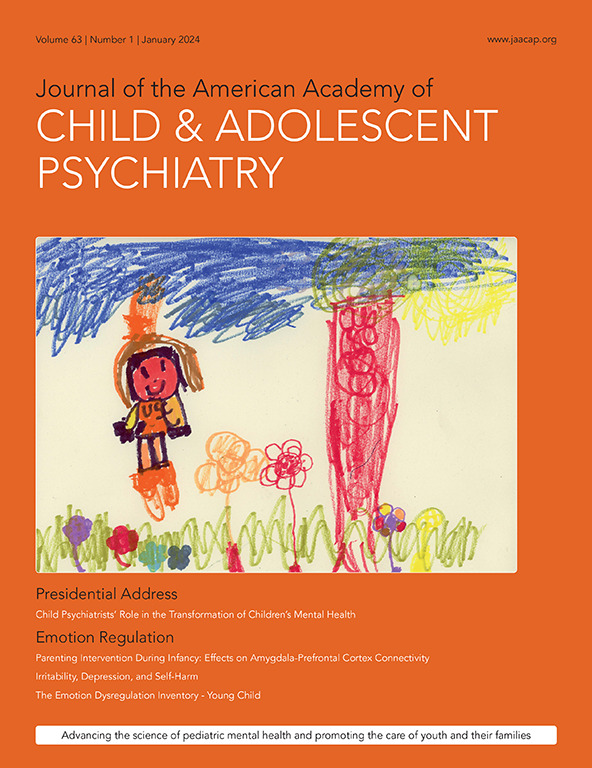A Systematic Review and Meta-Analysis: Psychotherapy Interventions for Reducing Suicidal Thoughts and Behaviors Among Black Youth
IF 9.5
1区 医学
Q1 PEDIATRICS
Journal of the American Academy of Child and Adolescent Psychiatry
Pub Date : 2024-08-22
DOI:10.1016/j.jaac.2024.08.007
引用次数: 0
Abstract
Objective
Suicides continue to increase among youth, with substantial disparities among Black youth. Culturally responsive evidence-based interventions for Black youth are urgently needed to disrupt these inequities. This study aimed to identify evidence-based psychotherapy interventions for suicidal thoughts and behaviors among Black youth and examine how existing intervention manuals have integrated culturally relevant content to Black youth.
Method
Literature searches were conducted to identify relevant articles comparing the effectiveness of interventions for suicidal thoughts and behaviors in study populations including >30% Black youth and youth participants up to age 25. Published articles and therapy manuals were analyzed on cultural adaptation and on 7 content domains for cultural adaptation. Meta-analysis used a random-effects model and explored potential moderators.
Results
Of 755 screened records, 13 studies met eligibility criteria and featured 8 manualized interventions. Meta-analysis revealed significant effects in reducing suicidal thoughts and behaviors between treatment groups (Hedges g = 1.08 with 95% CI [0.07, 2.09]), but low-quality evidence, significant heterogeneity, small sample sizes, and inconsistencies in outcome measures. Only 1 intervention, Adapted Coping With Stress (A-CWS), specifically focused on Black youth. Culturally relevant content was predominantly absent or contained brief descriptions. The most frequently included content was provider cultural competency training.
Conclusion
The lack of representation of Black youth in treatment studies and sparse literature on culturally responsive treatments for Black youth and their families continue to stall significant advancements to disrupt current suicide trends disproportionately impacting Black youth. This study identified several opportunities for implementing cultural adaptations of suicide interventions among Black youth.
Plain language summary
This systematic review and meta-analysis of 13 studies of 8 manualized interventions involving 1,972 youth found evidence for decreasing self-injurious thoughts and behaviors among Black youth. Only one of the included interventions specifically focused on Black youth. Culturally relevant content was limited, making a case for the inclusion of culturally tailored approaches. The authors discuss opportunities for implementing cultural adaptations of suicide interventions among Black youth.
Diversity & Inclusion Statement
One or more of the authors of this paper self-identifies as a member of one or more historically underrepresented racial and/or ethnic groups in science. One or more of the authors of this paper self-identifies as a member of one or more historically underrepresented sexual and/or gender groups in science. One or more of the authors of this paper received support from a program designed to increase minority representation in science. We actively worked to promote inclusion of historically underrepresented racial and/or ethnic groups in science in our author group. While citing references scientifically relevant for this work, we also actively worked to promote sex and gender balance in our reference list. While citing references scientifically relevant for this work, we also actively worked to promote inclusion of historically underrepresented racial and/or ethnic groups in science in our reference list. We actively worked to promote sex and gender balance in our author group. One or more of the authors of this paper self-identifies as living with a disability. The author list of this paper includes contributors from the location and/or community where the research was conducted who participated in the data collection, design, analysis, and/or interpretation of the work.
系统回顾和元分析:减少黑人青少年自杀想法和行为的心理治疗干预。
目标:青少年自杀率持续上升,其中黑人青少年自杀率差异巨大。为消除这些不平等现象,亟需针对黑人青少年采取与文化相适应的循证干预措施。本研究旨在确定针对黑人青少年自杀想法和行为(STBs)的循证心理治疗干预措施,并研究现有干预手册如何将与黑人青少年文化相关的内容纳入其中:方法:我们进行了文献检索,以确定比较自杀想法和行为(STBs)干预措施有效性的相关文章、黑人青年占比大于 30% 的研究人群以及 25 岁以下的青年参与者。对已发表的文章和治疗手册的文化适应性以及文化适应性的七个内容领域进行了分析。元分析采用随机效应模型,并探讨了潜在的调节因素:在筛选出的 755 条记录中,有 13 项研究符合资格标准,其中包括 8 项手册化干预措施。Meta 分析显示,不同治疗组在减少 STB 方面效果显著(Hedges' g=1.08 ,95% CI [.07, 2.09]),但证据质量低、异质性大、样本量小、结果测量不一致。只有一项干预,即 "适应压力"(A-CWS),专门针对黑人青少年。与文化相关的内容主要缺失或只有简短的描述。最常包含的内容是提供者文化能力培训:黑人青年在治疗研究中缺乏代表性,针对黑人青年及其家庭的文化适应性治疗文献也很稀少,这些都继续阻碍着在阻断当前对黑人青年影响尤为严重的自杀趋势方面取得重大进展。我们发现了对黑人青少年自杀干预措施进行文化适应性调整的几个机会。
本文章由计算机程序翻译,如有差异,请以英文原文为准。
求助全文
约1分钟内获得全文
求助全文
来源期刊
CiteScore
21.00
自引率
1.50%
发文量
1383
审稿时长
53 days
期刊介绍:
The Journal of the American Academy of Child & Adolescent Psychiatry (JAACAP) is dedicated to advancing the field of child and adolescent psychiatry through the publication of original research and papers of theoretical, scientific, and clinical significance. Our primary focus is on the mental health of children, adolescents, and families.
We welcome unpublished manuscripts that explore various perspectives, ranging from genetic, epidemiological, neurobiological, and psychopathological research, to cognitive, behavioral, psychodynamic, and other psychotherapeutic investigations. We also encourage submissions that delve into parent-child, interpersonal, and family research, as well as clinical and empirical studies conducted in inpatient, outpatient, consultation-liaison, and school-based settings.
In addition to publishing research, we aim to promote the well-being of children and families by featuring scholarly papers on topics such as health policy, legislation, advocacy, culture, society, and service provision in relation to mental health.
At JAACAP, we strive to foster collaboration and dialogue among researchers, clinicians, and policy-makers in order to enhance our understanding and approach to child and adolescent mental health.

 求助内容:
求助内容: 应助结果提醒方式:
应助结果提醒方式:


